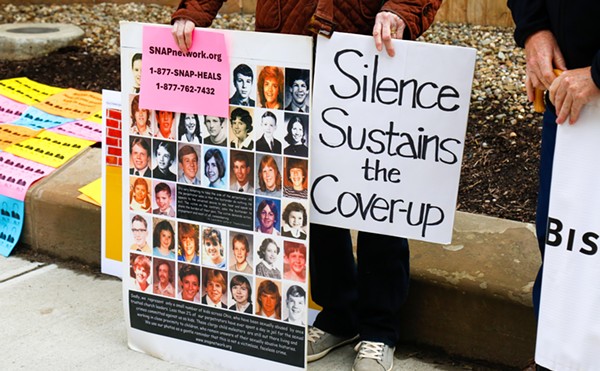For those first 20 years,Michael Brown never had problems getting a job. Perhaps it was his unfailingly polite demeanor. Maybe it was the put-together vibe he exuded, with his ever-present wire-framed glasses and the crisp clothes he wore even on casual days. Brown looked every bit the part of a disciplined, get-it-done type of guy. And for those 20 years, he was.
A native of Cleveland's Lee Harvard area, he served a stint in the Marines during the 1970s. He eventually moved to Columbus, where he worked for the Defense Finance and Accounting Service. "I was a coding officer," he says. "It was inputting information off military contracts into the computer."
And through it all, he was addicted to crack. "I kept myself up pretty nicely," Brown says. "Hardly anybody was able to tell that I was on drugs."
But because of his habit, Brown bounced from position to position, never lasting more than four years in any one place. Living for a while in Ashtabula, he found his life unraveling when he became involved in a fight he claims was instigated by his then-wife. When he tried to flee, he only made matters worse. "I just happened to take off running; I was tired of fighting with these guys," he remembers thinking. "I ran into a house."
Unfortunately for Brown, the home belonged to a county sheriff's deputy. He asked the man to call police, and the deputy obliged. When an officer arrived, it was Brown who was arrested.
He was convicted on charges of burglary and tampering with evidence, and spent the next year at the Ohio State Penitentiary in Youngstown. When he got out, he returned home to Cleveland, where he had a felony next to his name and no shortage of company on the unemployment line.
The neighborhoods of Northeast Ohio — and especially Cleveland — are a hub for ex-offenders. According to the Ohio Department of Rehabilitation and Correction, it's strictly a numbers game: In fiscal year 2011, about 22,000 people were sent to Ohio's prisons; 18 percent of them (around 4,000) came from Cuyahoga County — more than Hamilton County (Cincinnati) and Franklin County (Columbus) combined.
"Our general sense is that most offenders go back to the county from which he or she was sentenced — usually also the offender's home county," says ODRC spokeswoman JoEllen Smith.
But Northeast Ohio, it seems, gets an annual ex-con bonus: According to the Cuyahoga County Office of Reentry and the ODRC, about 5,000 inmates return to Cuyahoga County from state prisons every year — around a thousand more than we send off to the pen in that same span.
And there's no relief in sight: The number of ex-cons funneling back to Cleveland will grow, thanks to recently enacted sentencing reforms that will reduce the state's prison population by 3,000 to 4,000 over the next four years. About 900 of those are expected to return to civilian life in Cuyahoga County, and 79 percent of them will land in Cleveland.
Most will wind up in poverty-stricken areas. According to a study by the Urban Institute, a Washington-based think tank that researches social and economic issues, the majority of returnees will settle in five of the city's most socially and economically fragile neighborhoods: Glenville, Hough, Central, Mount Pleasant, and Union Miles. In Central, for example, the 2009 median household income was about $7,600. The same figure for Hough was close to $14,000. Both were well below the city's median income of roughly $24,700.
And they'll return to a region where competition for work is ferocious even for those without criminal histories, where unemployment rates have hovered around 10 percent for years.
Like Michael Brown, about 7 out of 10 ex-offenders are African American, and their job prospects are even worse than their white counterparts. An analysis by the Economic Policy Institute found that, in Greater Cleveland, the average unemployment rate among blacks is 18.1 percent — nearly twice the overall average for the region. Not surprisingly, black ex-offenders fight prejudices against race as well as their criminal histories. Studies by Devah Pager, a sociologist from the University of Minnesota, have repeatedly found that white male ex-cons who are job hunting earn more second interviews than African American males who have no criminal record. Black males with a record get the least interest.
Stella Shepard is a job trainer with Networks 4 Success, a four-week "employment readiness" program for ex-convicts that's part of a workforce development nonprofit called Towards Employment. To the 20 unemployed hopefuls awaiting instructions in a conference room at Playhouse Square on this day, Shepard is more like a drill sergeant.
She's leading an exercise to reveal personality traits deemed necessary for specific jobs. The group has already spent half an hour brainstorming, and now they've set about tacking large sheets of chart paper on the walls around the room at Shepard's command.
She groups the class by potential occupations: Maintenance workers are ordered to cluster in front of one sheet, warehouse and shipping clerks by another. The business analyst stands alone.
"Come down an inch and a half, and draw a line from side to side," she says, barking directions for each group to draw a large chart on their paper. "Be decisive. That's a good skill.
"On top of the line, write the job field in large letters. I need to see that from wherever I am."
Shepard's brusque manner is intended to help her charges develop "soft skills," like following directions and having thick skin. They'll need both to get and keep a job.
When it comes to having a criminal history, everyone in the room rows the same boat. When it comes to the specific types of work each is suited for, though, the commonality fades. Some of them have never been employed legitimately, while others have only barely worked. Some had steady jobs after leaving prison or jail, but have since gotten laid off along with countless others in the local workforce. Now they're learning how much the world changed when they were punching a clock or biding time behind bars. While they weren't looking, online job applications and career sites have replaced newspaper want ads and paper applications.
Participation in Networks 4 Success is voluntary. And to each one of them here, Shepard's drills are no game. So everyone listens and follows directions precisely, each of them aware that their future depends on it. And with their future, so goes the future of Cuyahoga County and Cleveland.
According to the latest Census figures, one in three Cleveland families lives in poverty. As the region finds itself in the throes of reinvention, from withering industrial center to technology and health-care hub, its attempts to improve its fortunes are tied to the ability of ex-offenders to find meaningful work here. But its efforts may be stymied if people like Michael Brown, and the thousands of newly returned ex-cons less qualified than he is, end up gazing at jobs they can't — or get no chance to — fill.
The city's recent response has been to remove the question about past felonies from its job applications, a change advocated by the National Employment Law Project, a New York nonprofit that advocates for low-wage workers. Cleveland is now one of just 30 cities, counties, or states across the country that has eliminated the question, which opponents claim encourages hiring bias.
"We are quite concerned about the economic well being of people that have a criminal background, and how they seamlessly come back into our community is a priority for this administration," says Natoya Walker Minor, chief of public affairs for Cleveland. "I think it's a priority for this region."
Michael Brown spent his 50th birthday serving time for the only conviction of his life. Yet some good came of it, he insists: He was released in March 2007 a born-again Christian, sober, and committed to a new life.
"[Prison] was a place that I never thought I would be at 50 years old," he says. "So I made a lot of changes while I was incarcerated so that I wouldn't return to that lifestyle."
Since his release, Brown has written a book on his spiritual transformation and become a minister at a local non-denominational church. But he hasn't found meaningful work.
"I was searching for all kinds of jobs. I wasn't really particular," he says. "Even though my history was in administration, I was looking for janitorial, security, jobs with the Cleveland Clinic — all kinds of jobs.
"I did applications on the net. I did door to door. I finally wound up doing some landscaping."
Ironically, state law bars ex-felons from holding some of the jobs that attracted Brown's attention and matched his abilities. He can't work as a bank or hospital security officer, or as an EMT. Even being a volunteer firefighter is out of bounds. The prohibitions extend into health care — already a major industry across Northeast Ohio and one poised for rapid growth. Ex-felons can't work as aides in a nursing home, hospice, or a hospital because they can't hold jobs that involve providing direct care to older adults — or to children, for that matter. The restrictions are permanent, except for those rare occasions when a pardon is granted or a conviction reversed.
Despite Cleveland's change in application questioning, hiding a criminal history is almost impossible, now that criminal background checks are a routine part of the hiring process. A survey by the Society of Human Resource Management, a national organization for human resources professionals, found that 79 percent of employers performed criminal background checks on all job candidates. Ex-felons are especially stigmatized. The poll found 95 percent of respondents would not hire a candidate who had a conviction for a violent felony, and 79 percent would not hire someone convicted of a non-violent felony. But misdemeanors matter too: 58 percent of respondents wouldn't hire a candidate with a violent misdemeanor conviction; 22 percent said they wouldn't hire someone with a non-violent misdemeanor conviction.
Jill Rizika, executive director of Towards Employment, believes the prevalence of background checks is sending more dislocated workers to her organization's workshops for ex-offenders.
"We've been seeing over the last two years ... more people who have a criminal background, have been out for a while working, have lost their job due to the recession, and now it's so much harder for them to get back in," she says. "They've got work experience and skills. The issue is the criminal background."
Of course, the economic downturn is the reason most lost their jobs in the first place. And it's why ex-offenders are at such a disadvantage.
During the first decade of the 21st century, Cuyahoga County lost 132,762 jobs, according to George Zeller, an independent expert on the region's economy. From 2002 to 2007, all of those job losses were in Cleveland. But from 2007 to 2010, positions started disappearing in the suburbs too. Meanwhile, according to Zeller's analysis, jobs grew in social assistance, health care, and education — the very fields that bar ex-cons from consideration in most cases, according to state law.
"Things are getting worse for those who have no felony record," Zeller says. "The context for guys with a felony is that they are in a labor market with tough competition for the jobs that are left."
It's been more than four years since Michael Brown's release from prison. At 55, he's still looking for his first steady work. He's had a small job as a church security guard, but was eventually laid off. He'd been able to piece together enough yard-work gigs to buy a truck and some equipment, and he got an apartment of his own on East 93rd Street, near Kinsman.
So he crosses his fingers, reads the Bible, and renews his faith at every turn.
"I have to keep focused on the Lord first and foremost, and then focus on the things that I know I need to do to become a successful person in life."
Just recently, Brown was turned down for another job. He asked for a reason why, but got no response. He figures it's the felony.











